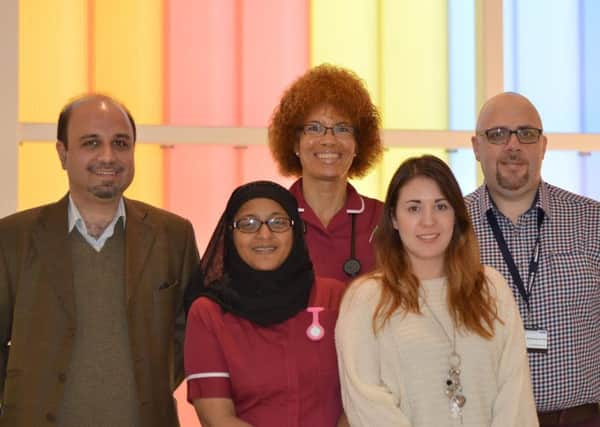Kettering hospital praised for its research into heart rhythm disorder


The trust’s cardiology research team has achieved the highest level of recruitment and retention in the UK for the EAST Study - the Early Treatment of Atrial Fibrillation for Stroke Prevention Trial.
This 10-country European trial is comparing two different treatment strategies for addressing atrial fibrillation – a rhythm disorder that causes irregular and very fast heart rate.
Advertisement
Hide AdAdvertisement
Hide AdIn the study one group of patients receives medication and cardiac procedures in a certain order, with another group receiving them in a different order to find out which kind of strategy is the most effective.
The trial is being run across Europe by the German Atrial Fibrillation Network (AFNET) in cooperation with the European Heart Rhythm Association (EHRA).
Kettering General Hospital has achieved the highest UK recruitment to the trial with 32 participants.
Overall 19 UK hospitals are taking part in the study.
Consultant cardiologist and principal investigator, Dr Salman Nishtar, said: “I am pleased and proud that Kettering General Hospital’s cardiac research team has been acknowledged at a national and international level for conducting excellent research - particularly for the EAST study.
Advertisement
Hide AdAdvertisement
Hide Ad“We have consistently been the top UK recruitment centre for this study achieving high levels of patient participation.
“I would like to congratulate the entire research team for their commitment and excellent efforts and to thank all of our patients for making this important contribution to research into this quite common heart rhythm disorder.”
The hospital’s study co-ordinator Charmaine Beirnes is the first point of contact for the EAST study at the hospital.
She said: “The success at Kettering is down to teamwork.
“Patients are found across various departments, and weekly research meetings ensure that colleagues in the trust are aware of the research projects and can highlight potential eligible patients.
Advertisement
Hide AdAdvertisement
Hide Ad“KGH is a regional hub for referrals, and the referrals are screened for patients suitable for EAST.
“I then ensure that potential participants’ details are reviewed by Dr Nishtar to ascertain their eligibility.
“We take the time to very carefully explain the study to patients and they have been very supportive of us and the work we are doing.
“By taking part in research people do have the benefit of more detailed monitoring of their own condition which can have some positive benefits in their own care and treatment.”
Advertisement
Hide AdAdvertisement
Hide AdThe aim of the study is to improve treatments in the future for the condition – which is the most common “serious” heart rhythm abnormality in people over the age of 65 years.
Roberta Forman, 75, from Great Oakley was diagnosed with atrial fibrillation in August 2013 and agreed to participate in research immediately.
She said: “I think it is very important for research to be carried out so that doctors and nurses can give the very best treatments available for patients.
“I was asked to take part in the study in August 2013 and I was happy to do so.
Advertisement
Hide AdAdvertisement
Hide Ad“By taking part I benefit from some additional monitoring which gives you peace of mind.
“I get brilliant care because I am seen by my consultant every six to eight months and see Charmaine for the research regularly as well.
“This gives me extra confidence in my care, and at the same time I know I am doing something that will benefit future heart patients.”